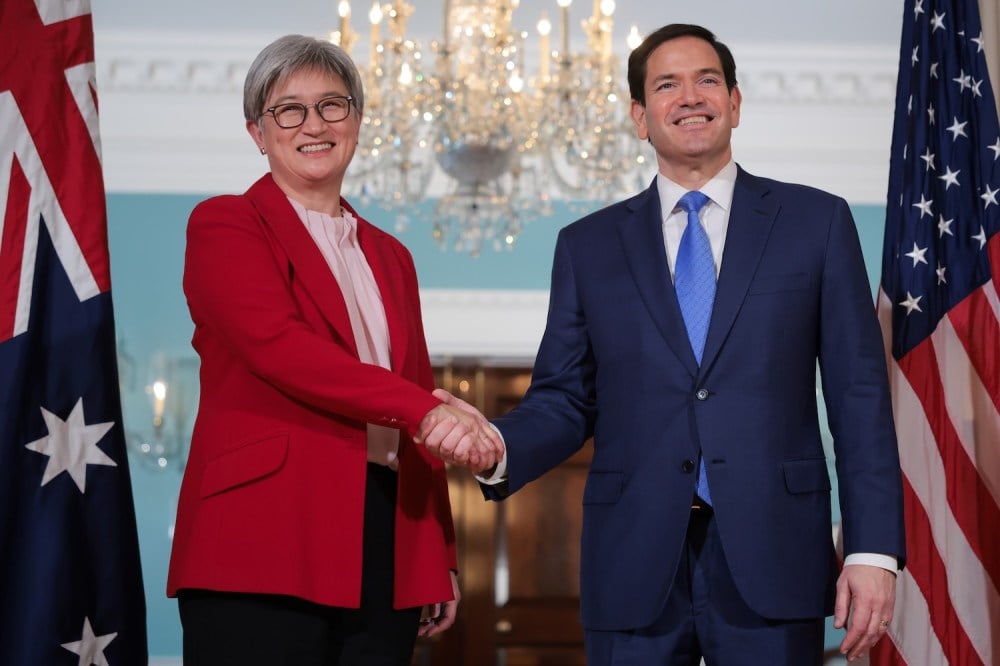
The Australia-United Kingdom-United States security pact, commonly known as AUKUS, appears to have passed a Trump administration review unscathed, according to a recent Nikkei Asia report that cites an official from an AUKUS member country. Unless something dramatically changes between now and Oct. 20, when Australian Prime Minister Anthony Albanese visits the White House—always a possibility in Trump world—then Washington will continue participating in AUKUS as before.
AUKUS is a key component of the Indo-Pacific strategy that the Trump administration inherited from its predecessor. Critical to the defense of Australia, the pact entails joint production of nuclear-powered submarines, the sale of three Virginia-class submarines to Canberra by the early 2030s (with an option for two more), as well as many other collaborative measures, such as U.S. troop rotations at Australian bases and cooperation on hypersonic missiles and other weapons technologies that will enhance deterrence against China.
It was certainly not a foregone conclusion that AUKUS would survive heightened scrutiny. U.S. President Donald Trump has soured on many of Washington’s traditional allies and partners, questioned long-standing U.S. security commitments, and lashed out at friendly countries with harsh tariffs. He has made it a point to reverse many, if not most, Biden-era programs, and thus AUKUS—the brainchild of Biden administration Indo-Pacific coordinator Kurt Campbell—appeared to be on the chopping block as well. Indeed, administration sources early on cast doubt over some of the pact’s provisions. Additionally, the Department of Government Efficiency run by tech billionaire Elon Musk was implementing cost-cutting measures across the U.S. government, and at times, these included the downsizing or elimination of defense programs.
Trump’s no. 3 at the Pentagon, Undersecretary of Defense for Policy Elbridge Colby, led the review this summer, ostensibly to ensure that AUKUS was properly aligned with Trump’s so-called America First foreign policy.
Yet another reason for concern was that the Trump administration’s emerging foreign policy appears to slightly downgrade the importance of waging great-power competition against China in the Indo-Pacific. Instead, the priority will be on the defense of the Western Hemisphere and U.S. homeland security, according to the forthcoming National Defense Strategy, which Colby also headed. In addition, Trump has signaled many times that he wants to strike a “deal” with Chinese leader Xi Jinping—with some White House actions suggesting that this could come at the expense of Taiwan. These were all good reasons to believe that the Trump team might abandon AUKUS.
But the durability of AUKUS across administrations suggests, for one, that U.S. deterrence against China remains a strategic priority, and second, that enlisting Australian support toward this goal adds value. Although Canberra has never linked AUKUS directly to war against China, nor has it ever pledged to use AUKUS assets for such a purpose, Australia has nevertheless highlighted the benefit of AUKUS in a crisis or wartime situation. Australian Defense Minister Richard Marles, for example, noted in 2023: “All of our trade to Japan, all of our trade to South Korea … goes through the South China Sea. … The maintenance of the rules-based order, as we understand it—freedom of navigation, freedom of overflight—is completely in Australia’s interests. … And that’s why we have to walk down the path that we are.”
The outcome of Colby’s review further holds several significant geostrategic implications. One is that in spite of political currents to the contrary—especially among Trump’s hardcore MAGA base, which complains about interminable U.S. involvement in “globalism” and generally wants to see the U.S. military do less around the world to redirect resources back home—Trump is actually signaling continuity rather than a break with past policy. Indeed, since George W. Bush’s presidency, Washington has generally prioritized competing with Beijing across the spectrum of statecraft, and it was Trump during his first term who intensified this competition. In 2021, AUKUS became part of the military component of these efforts.
Retaining AUKUS also helps to clarify Trump’s China policy as he prepares to meet with Xi on the sidelines of the Asia-Pacific Economic Cooperation summit in South Korea later this month. Unlike during his first term, when he was staunchly and consistently anti-China, Trump has sent conflicting messages since returning to the White House, making it unclear whether he wanted to engage or counter China. Trump said, for example, that he wanted to meet Xi in Beijing, probably in order to further reset the bilateral relationship. A recent report suggests that Xi’s price for Trump’s reset is an explicit affirmation that Washington “opposes” Taiwan’s independence. But it remains unclear what Beijing is willing to offer and Trump might be willing to accept for the deal Trump seeks to strike.
Uncertainty over U.S. policy has been particularly worrying for Taiwan. Perhaps to send positive signals to Xi, the Trump administration denied Taiwanese President Lai Ching-te’s transit through the U.S. for a planned visit to Latin America over the summer. Trump also reportedly nixed $400 million in military assistance to Taiwan. At the same time, however, his administration is planning the largest-ever arms package to Taiwan, exceeding the $18.3 billion in deliveries during Trump’s first term. Regardless, the survival of long-term commitments under AUKUS gives more confidence to those who believe Trump wants to remain tough on China, rather than only appearing to be tough in order to get a better deal on trade or any number of other things later down the line.
Trump’s decision to keep AUKUS is obviously a good thing for Australia. After already investing around $1 billion in the program (and planning to spend as much as $240 billion over the next three decades), Canberra has a major stake in the success of AUKUS. Albanese said that the pact will provide “the single biggest leap in our defense capability in our history.” Meanwhile, Australians have already begun training how to build, maintain, and operate nuclear-powered AUKUS submarines. Put simply, Canberra cannot afford an AUKUS failure.
Trump’s acceptance of AUKUS also goes a long way toward lifting other U.S. allies and partners’ faith in Washington’s staying power in the Indo-Pacific. Japan, India, New Zealand, the Philippines, Singapore, South Korea, Taiwan, Thailand, Vietnam, and others will take note of Washington’s decision to stay engaged rather than drift away from the region as China’s power and influence rise. Indeed, keeping AUKUS counters the barrage of bad news on how the Trump administration has mistreated U.S. allies and partners. It also helps negate any lingering doubts about the future of U.S. forces in the region, such as an earlier rumor—which the administration has denied—that the United States might withdraw 4,500 troops from South Korea.
Furthermore, had the Trump administration scrapped AUKUS, then a planned follow-up to the pact—a so-called AUKUS Pillar II—would naturally have been in trouble as well. Pillar II seeks to include other friendly nations—including Canada, Japan, New Zealand, and South Korea—in collaborative efforts in high technology with military relevance, such as undersea capabilities, quantum science, artificial intelligence, cyber, hypersonic technology, and electronic warfare. Further efforts involve industrial base cooperation, information sharing, interoperability, and other areas of closer collaboration.
In the end, the Trump administration’s move to retain AUKUS is strategically correct, even if pressure from its hard-right MAGA constituency creates some political risk. The reality is that AUKUS not only enhances U.S. efforts to deter China but also supports a key U.S. security ally, Australia. It sends the right message to Washington’s broader network of allies and partners: In spite of its domestic political turmoil and flirtation with restraint and isolationism, the United States still plans to remain active in the most dynamic and important region in the world. For this, the Trump administration certainly deserves some credit.



